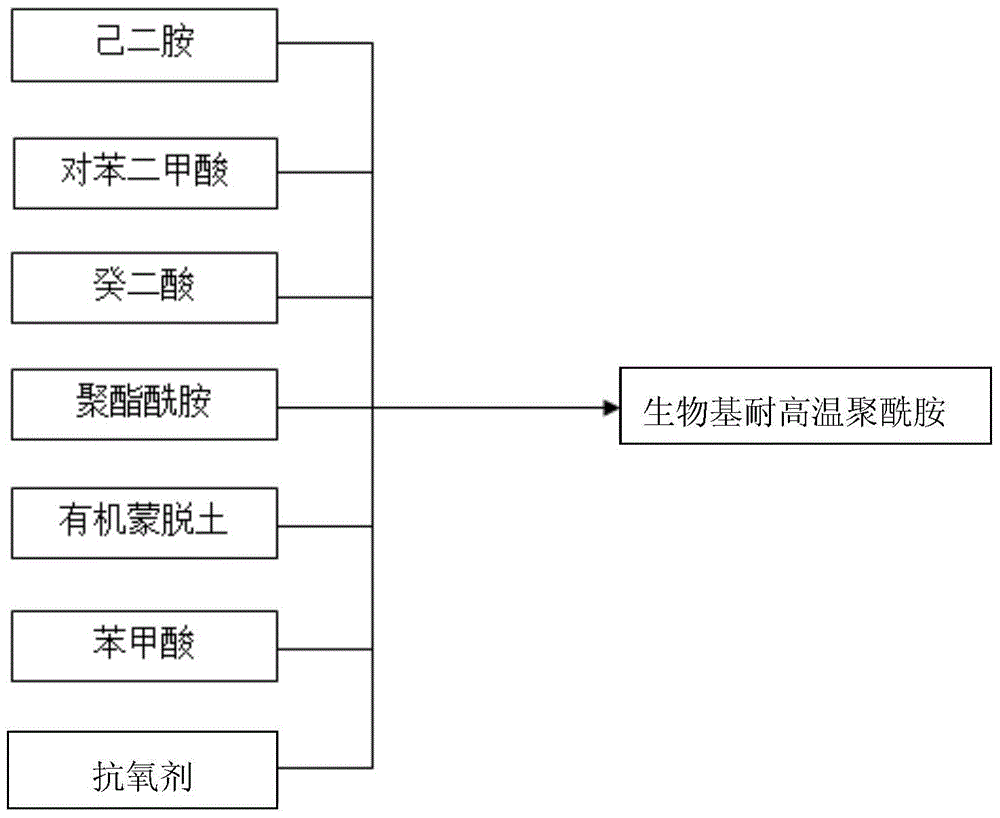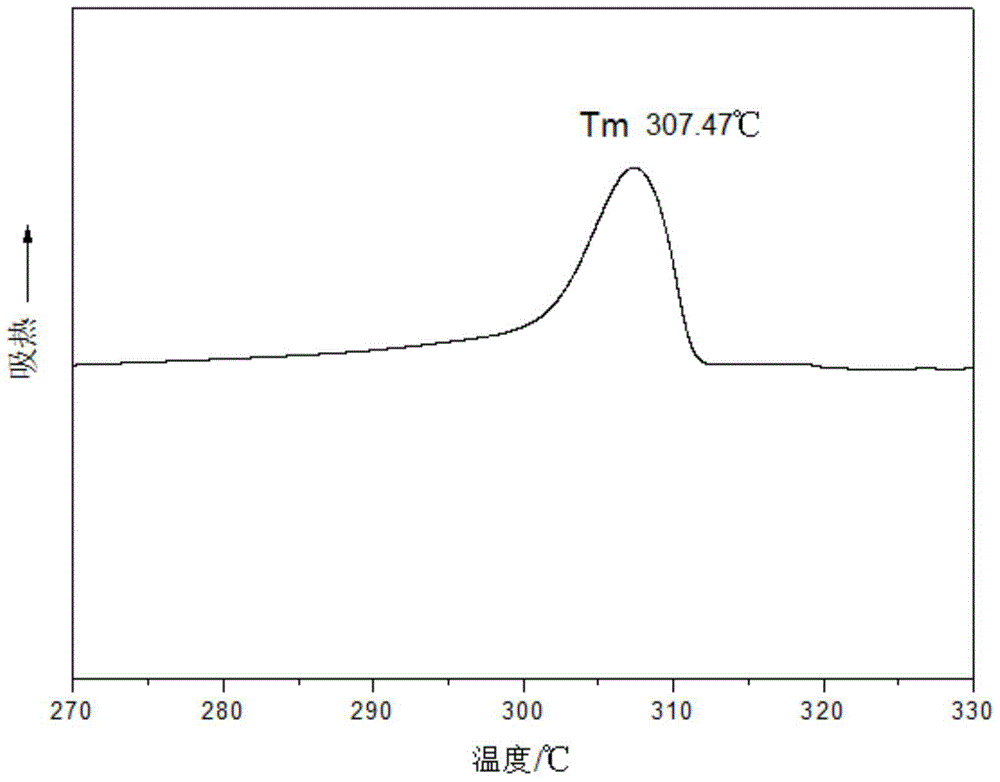Bio-based high temperature resistant polyamide and its synthesis method
A synthesis method and high-temperature-resistant technology, applied in the field of materials, can solve the problems of restricting the large-scale promotion of solid-phase polymerization, accelerating the discharge of small molecules of by-products, and many solid-phase polymerization production processes, achieving excellent processing performance, improving productivity, reducing The effect of the process
- Summary
- Abstract
- Description
- Claims
- Application Information
AI Technical Summary
Problems solved by technology
Method used
Image
Examples
Embodiment 1
[0076] The raw material composition and synthetic steps of the polyester amide used in the present embodiment are as follows:
[0077] (1) Vacuum-dried monomer 2: 1006.6g (5mol) 11-aminoundecanoic acid, 456.6g (4mol) 6-caprolactone, 270.3g (1.25mol) 2,2'-(1,3 -Phenylene)-bisoxazoline was added to the stirred polymerization reactor, and tetrabutyl titanate (17.3 g) of 1% of the total weight of monomer 2 was added as a catalyst, and 500 mL of water was added as a mass transfer and heat transfer Then vacuumize for 5 minutes, pass nitrogen for 5 minutes, and circulate like this for 6 times, so that the reactant exists in the environment under nitrogen protection, and the system pressure in the stirred polymerization reactor is controlled to be 0.2MPa;
[0078] (2) within 2.5 hours, heat the stirred polymerization reactor to 250°C at a uniform speed, and adjust the stirring speed of the stirred polymerization reactor to 40r / min, wherein, when the temperature of the stirred polymeri...
Embodiment 2
[0083] The raw material composition and synthesis steps of the polyester amide used in this example are the same as those in Example 1.
[0084] In this embodiment, a synthetic method of bio-based high temperature resistant polyamide comprises the following steps:
[0085] (1) Vacuum-dried monomer 1: 116.2g (1mol) hexamethylenediamine, 91.4g (0.55mol) terephthalic acid, 91.0g (0.45mol) sebacic acid were added to the stirred polymerization reactor, Add simultaneously the polyester amide of 8% (23.9g) of monomer 1 gross weight, the organic montmorillonite of 8% (23.9g), the benzoic acid of 3% (9.0g), the N of 0.3% (0.9g), N`-bis(2,2,6,6-tetramethyl-4-piperidinyl)-1,3-benzenedicarboxamide, add 100mL water as the medium for mass transfer and heat transfer; then vacuumize for 5min, pass Nitrogen for 5 minutes, so circulated 6 times, so that the reactant exists in the environment under the protection of nitrogen, and the system pressure in the control stirred polymerization reactor...
Embodiment 3
[0088] The raw material composition and synthesis steps of the polyester amide used in this example are the same as those in Example 1.
[0089] In this embodiment, a synthetic method of bio-based high temperature resistant polyamide comprises the following steps:
[0090] (1) Vacuum-dried monomer 1: 116.2g (1mol) hexamethylenediamine, 116.3g (0.7mol) terephthalic acid, 60.7g (0.3mol) sebacic acid were added to the stirred polymerization reactor, Add the polyester amide of 2% (5.9g) of monomer 1 total weight simultaneously, the organic montmorillonite of 0.5% (1.5g), the benzoic acid of 0.5% (1.5g), the N of 0.2% (0.6g), N`-bis(2,2,6,6-tetramethyl-4-piperidinyl)-1,3-benzenedicarboxamide, add 100mL water as the medium for mass transfer and heat transfer; then vacuumize for 5min, pass Nitrogen for 5 minutes, so circulated 6 times, so that the reactant exists in the environment under the protection of nitrogen, and the system pressure in the control stirred polymerization reacto...
PUM
| Property | Measurement | Unit |
|---|---|---|
| glass transition temperature | aaaaa | aaaaa |
| melting point | aaaaa | aaaaa |
| melting point | aaaaa | aaaaa |
Abstract
Description
Claims
Application Information
 Login to View More
Login to View More - R&D
- Intellectual Property
- Life Sciences
- Materials
- Tech Scout
- Unparalleled Data Quality
- Higher Quality Content
- 60% Fewer Hallucinations
Browse by: Latest US Patents, China's latest patents, Technical Efficacy Thesaurus, Application Domain, Technology Topic, Popular Technical Reports.
© 2025 PatSnap. All rights reserved.Legal|Privacy policy|Modern Slavery Act Transparency Statement|Sitemap|About US| Contact US: help@patsnap.com



